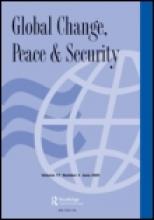Europe between Islam and the United States: Interests, Identity and Geopolitics.
Joseph A. Camilleri, ‘Europe between Islam and the United States: Interests, Identity and Geopolitics’, Global Change, Peace and Security, Vol. 20, No. 1, February 2008, pp. 9-24.

Europe and its leaders, though they may not fully comprehend the significance of the events that are rapidly unfolding, and whether they like it or not, are key players in the historical process that will shape the geopolitics of the Middle East and Islam's response to the challenge of modernity. This is not say that Europe has it in its power to determine the choices that Iran and the Arab world will make, nor indeed should it attempt to do so. On the other hand, it does have a margin of manoeuvre which, depending on the way it is exercised, may tilt the balance in favour either of the politics of coexistence and cooperation or the politics of confrontation. European choices and capacities will revolve around four questions: How will European policies and attitudes position themselves vis-à-vis the Orientalist tendencies of the past? What steps might be taken to clear the backlog of unresolved geopolitical tensions and misunderstandings? Can Europe develop a programmatic approach to regional and international governance which accepts cultural plurality as its foundation stone, even if this should create tensions in the transatlantic relationship? Is Europe disposed to forge a new social compact that accepts Muslims in Europe as European citizens fully engaged in the task of European construction? The article argues that these are not four unrelated questions, each with its own separate logic and modus operandi, but four mutually constitutive policydilemmas that will in large measure reflect and in part shape European efforts to fashion a new identityand sense of place in the world.
